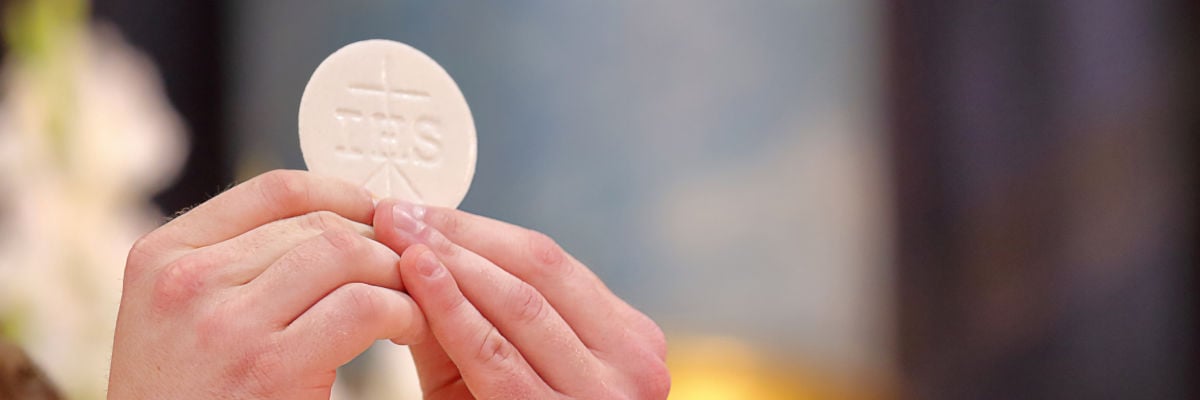
With the U.S. bishops recently voting to draft a document that will discuss worthiness to receive Communion, it could be helpful to review the basics of what canon law currently holds.
The two most important canons are 915 and 916, which read:
Can. 915 Those who have been excommunicated or interdicted after the imposition or declaration of the penalty and others obstinately persevering in manifest grave sin are not to be admitted to holy communion.
Can. 916 A person who is conscious of grave sin is not to celebrate Mass or receive the body of the Lord without previous sacramental confession unless there is a grave reason and there is no opportunity to confess; in this case the person is to remember the obligation to make an act of perfect contrition which includes the resolution of confessing as soon as possible.
Both canons involve situations in which a person is not to receive Communion, but they deal with the topic from different angles.
Canon 916 approaches it from the viewpoint of someone who is aware that he has committed mortal sin (grave sin in canonical jargon) and hasn’t been to confession.
It expresses the basic rule that such people need to go to confession before receiving Communion. Those in this situation are not to present themselves for Communion.
This rule is commonly understood. What is less well known is that there is an exception: it is possible to receive Communion prior to going to confession in cases where there is a grave need and no opportunity to confess, and the person returns to a state of grace by making an act of perfect contrition.
This exception is possible because the fundamental requirement for the worthy reception of Communion is being in a state of grace, and that can be achieved either by going to confession or by making an act of perfect contrition with the intent to confess.
This exception is not commonly encountered by ordinary members of the faithful, as there usually is not a grave need to receive Communion at a particular moment, and it is possible to simply wait until after confession. However, it can arise—for example, in the case of a priest who needs to celebrate Mass and has no opportunity to confess to another priest.
Canon 915 approaches the subject from the perspective of those administering Communion rather than receiving it. It identifies several classes of people who “are not to be admitted” to Communion, meaning that it is to be withheld from them even if they present themselves to receive.
The first two classes of people are those who have been excommunicated or interdicted. These penalties follow from committing particularly grave canonical crimes.
Even in these cases, the penalties must be imposed or declared before the person is to be denied Communion. Canonically speaking, if someone incurs automatic excommunication, he will not be denied Communion until the excommunication is declared by the competent authority (though, of course, he still should not present himself for Communion, per canon 916).
Notice that this canon distinguishes between excommunication and denial of Communion. Despite what you might think from the word excommunication, not everyone who is to be denied Communion is excommunicated. Excommunication is a penalty that involves more than just being denied Communion. Its effects are spelled out in canon 1331.
Canon 915 thus envisions a group of people who are not excommunicated but who are to be denied Communion because they are “obstinately persevering in manifest grave sin.”
It requires careful consideration for Church authorities to assess that a person is in such a situation. Canon 912 provides that “any baptized person not prohibited by law can and must be admitted to holy Communion” (cf. can. 843 §1).
Furthermore, the Code of Canon Law provides that “laws which establish a penalty, restrict the free exercise of rights, or contain an exception from the law are subject to strict interpretation” (can. 18).
These canons require that a high bar be met before a member of the faithful can be denied Communion.
In the case of those “obstinately persevering in manifest grave sin,” each of the named criteria must be verified and interpreted strictly.
The person must be committing actual sin. This goes beyond doing things that are foolish, distasteful, or offensive. Actual sin must be involved.
Furthermore, the sin must be grave, and in light of the strictness with which the requirement is to be interpreted, it must be clearly so. Doubtfully or arguably grave sin is not sufficient under a strict interpretation. Only sin that clearly crosses the line into grave territory will fulfill this requirement.
The grave sin must be manifest. This is a term of art in canon law that refers to the sin being publicly known. If the sin is private or known by only a few people, it is not manifest. Under a strict interpretation, the grave sin must be known by a significant portion of the community.
Finally, the person must obstinately persevere in the sin. Under the strict interpretation that canon law requires, this condition is not fulfilled unless ecclesiastical authorities have made a serious effort to warn the person and given him a suitable time to repent. It is only when he continues to persist in the sin despite the warnings that he is judged to be obstinately persevering in it.
A logical next question would be, who is charged with making these determinations? The law does not address this question directly. However, the principles it contains indicate the general answer.
On the parish level, the role of making these determinations would ordinarily fall to the pastor. Given the seriousness with which canon law takes the right of the faithful to receive Communion, apart from very special circumstances, other individuals in the parish should consult with the pastor before determining that a parishioner is not to be admitted.
On the diocesan level, the authority to make the determination falls to the bishop. The same applies in cases of doubt on the parish level, and the bishop is to be consulted whenever a question arises about a particular case.
Public attention has been drawn to this issue because of the possibility that the bishops of the United States might promulgate a document addressing the situation of politicians who support abortion or other positions contrary to Catholic teaching.
At their June meeting, the bishops voted to allow their Committee on Doctrine to draft a teaching document on the Eucharist, which would be considered for adoption by the bishop’s conference at a future meeting (possibly in November). It was made clear that the draft document would not mention particular politicians and would discuss general principles rather than seek to create a uniform national policy.
Should the bishops vote to approve and publish such a document, it likely will repeat the substance of a statement that the conference issued in 2004 called Catholics in Political Life. That document stated:
The question has been raised as to whether the denial of Holy Communion to some Catholics in political life is necessary because of their public support for abortion on demand. Given the wide range of circumstances involved in arriving at a prudential judgment on a matter of this seriousness, we recognize that such decisions rest with the individual bishop in accord with the established canonical and pastoral principles. Bishops can legitimately make different judgments on the most prudent course of pastoral action. Nevertheless, we all share an unequivocal commitment to protect human life and dignity and to preach the gospel in difficult times.



